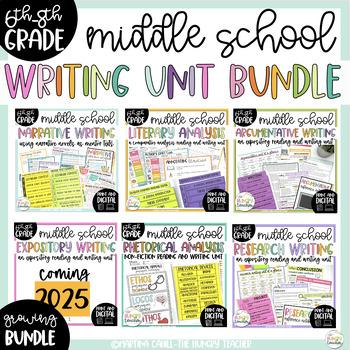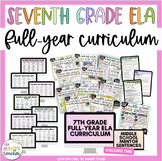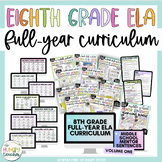Middle School Writing Units Argumentative Research Literary Analysis Narrative
- Zip
- Google Apps™

What educators are saying
Products in this Bundle (5)
Also included in
- Teaching all the Middle School ELA for 6th, 7th, and 8th grade Literature, Informational, Grammar, and Writing standards is completely broken down and done for you with this complete ELA curriculum bundle of units. This bundle includes all of my literary devices units, my nonfiction unit, all of myPrice $499.99Original Price $997.00Save $497.01
- Teaching all the sixth-grade middle school ELA Literature, Informational, Grammar, and Writing standards is completely broken down and done for you. Your entire year of eighth-grade reading, writing, and grammar curriculum is complete with this mentor text bundle of units. This ELA curriculum bundlePrice $297.00Original Price $481.28Save $184.28
- Teaching all the seventh-grade middle school ELA Literature, Informational, Grammar, and Writing standards is completely broken down and done for you. Your entire year of eighth-grade reading, writing, and grammar curriculum is complete with this mentor text bundle of units. This ELA curriculum bundPrice $297.00Original Price $452.30Save $155.30
- Teaching all the eighth-grade middle school ELA Literature, Informational, Grammar, and Writing standards is completely broken down and done for you. Your entire year of eighth-grade reading, writing, and grammar curriculum is complete with this mentor text bundle of units. This ELA curriculum bundlPrice $297.00Original Price $451.80Save $154.80
Description
Teach all the middle school ELA writing standards and concepts with this differentiated print and digital 6th, 7th, and 8th grade writing units. This growing bundle currently has narrative writing, literary analysis, argumentative, and rhetorical analysis writing units. A research writing unit and an expository writing unit will be added later.
Each unit includes four to five weeks of scaffolded, differentiated, and step-by-step lesson plans and teacher presentations to support and guide middle school ELA teachers in their writing instruction. The scaffolded lessons and resources are designed to teach students HOW to write instead of just telling them what to write. Your students will finally create writing pieces you look forward to reading.
Each lesson is quick and easy to set up, and I have done ALL the work for you. You could even leave these lesson plans for subs. Look at your daily lesson plans and pull up the accompanying teacher slides, and you have everything you need.
Here's what's included in each unit:
- Teacher Lesson Plans
- Teacher Presentations to accompany each lesson (PDF and digital)
- Daily Lesson Plan pacing guides, prep breakdown, and nonfiction articles or literature information
- Printable and digital reference pages for students
- Digital student writing notebooks
- Editable grading rubrics
- Differentiated examples of annotations, reading responses, outlines, and essays for every lesson
The lessons all build on the previous one so that students are learning new concepts and writing skills and being given time to practice and apply them. Each lesson is broken down step-by-step for teachers and each example is broken down with explanations for students.
The 23 Argumentative Writing Unit Sessions:
- Argumentative Lesson Day One: Collecting, Sorting, and Ranking Evidence
- Argumentative Lesson Day Two: Debate One- Taking a Position
- Argumentative Lesson Day Three: Argumentative Flash Draft One
- ArgumentativeLesson Day Four: Debate Two- Switching Your Position
- Argumentative Lesson Day Five: Elements of an Argumentative Paper
- Argumentative Lesson Day Six: Argumentative Flash Draft Two
- ArgumentativeLesson Day Seven: The Counter Argument
- Argumentative Lesson Day Eight: Debate Three- Taking a Position
- Argumentative Lesson Day Nine: Credible Sources- Learning + Practice
- Argumentative Lesson Day Ten: Argumentative Flash Draft Three + Thesis Statements
- ArgumentativeLesson Day Eleven: Logical Reasoning and Relevant Evidence
- Argumentative Lesson Day Twelve: Debate Four- Taking a Position
- ArgumentativeLesson Day Thirteen: Argumentative Flash Draft Four
- Argumentative Lesson Day Fourteen: Outlining an Essay- Claims and Curating Credible Sources
- Argumentative Lesson Day Fifteen: Outlining an Essay- Thesis Statements + Organizing Reasons and Evidence Logically
- Argumentative Lesson Day Sixteen: Argumentative Essay Introductions + Demonstrating Understanding
- Argumentative Lesson Day Seventeen: Argumentative Essay Body Paragraphs + Transitions Mini-Lesson
- Argumentative Lesson Day Eighteen: Argumentative Essay Drafts- Blending Quote + Clarifying Relationships Between Claims + Reasons + Evidence Mini-Lesson
- Argumentative Lesson Day Nineteen: Argumentative Essay Drafts- Counter Argument Mini-Lesson
- Argumentative Lesson Day Twenty: Argumentative Essay Conclusions
- Argumentative Lesson Day Twenty-One: Editing vs. Revising
- Argumentative Lesson Day Twenty-Two: Publishing Final Drafts
- Argumentative Lesson Day Twenty-Three: Writing Celebration!
The 15 Narrative Writing Unit Sessions:
- Session 1: Elements of Narrative Essays Part one
- Session 2: Elements of Narrative Essays Part Two
- Session 3: Narrative Plot Diagrams
- Session 4: Using Sensory Details
- Session 5: Using Dialogue Correctly
- Session 6: Using Dialogue Effectively
- Session 7: Ways to Start a Narrative, Writing Rough Drafts, Writing Conferences
- Session 8: Using Narrative Transitions, Writing Rough Drafts, Writing Conferences
- Session 9: Pacing Narrative Writing, Writing Rough Drafts, Writing Conferences
- Session 10: Ways to End a Narrative, Writing Rough Drafts, Writing Conferences
- Session 11: Consistent Verb Tenses, Peer Editing, Writing Conferences
- Session 12: Editing vs. Revising Rough drafts, Writing Conferences
- Session 13-15: Publishing final drafts, Writing Conferences
The 24 Literary Analysis Sessions:
- Summarizing vs. Analyzing
- Selecting and Reading Short Story One
- Annotating and Summarizing: Short story one
- Analyzing and Determining Strong Themes: Short story one
- Analyzing Important Scenes for Your Theme: Short story one
- Analyzing Author’s Craft: Short story one
- Analyzing Symbolism: Short story one
- Selecting, Reading, and Annotating Texts: Short story two
- Analyzing Themes in Important Scenes: Short story two
- Analyzing Author’s Craft: Short story two
- Analyzing an Author’s Craft Across Texts: Short story three or poem
- Analyzing Symbolism Across Texts: Short story three or poem
- Utilizing Counterclaims in Literary Analysis
- Part One: Using analysis and evidence together seamlessly for body paragraphs focusing on one text
- Part Two: Using analysis and evidence together seamlessly for body paragraphs focusing on two texts
- Comparative Literary Analysis Planning: Choosing either deep or wide analysis + Thesis statements and Claims + Quick Essay Outlines
- Literary Analysis Comparative Essay Introductions
- Literary Analysis Comparative Essay Body Paragraphs
- Literary Analysis Comparative Essay Drafts and Linking Words Mini-Lesson
- Literary Analysis Comparative Essay Drafts and Counterclaims Mini-Lesson
- Literary Analysis Comparative Essay Conclusions
- Editing vs. Revising
- Publishing Final Drafts
- Bonus: Writing Celebration!
The 20 Research Unit Sessions:
- Research Lesson Day One: Elements of a Research Paper
- Research Lesson Day Two: Formulating a Research Question
- Research Lesson Day Three: Credible Sources
- Research Lesson Day Four: Using Search Terms Effectively
- Research Lesson Day Five: Curating Credible Sources
- Research Lesson Day Six: Creating Related Questions
- Research Lesson Day Seven: Following a Standard Citation Format
- Research Lesson Day Eight: Gathering Relevant Information from Multiple Sources (2-3 days)
- Research Lesson Day Nine: Quoting and Paraphrasing + Avoiding Plagiarism
- Research Lesson Day Ten: Research Statement + Organizing a Research Paper
- Research Lesson Day Eleven: Research Paper Introduction + Demonstrating Understanding
- Research Lesson Day Twelve: Organizing a Research Paper's Sections + Paper Structure
- Research Lesson Day Thirteen: Organizing a Research Paper's Sections 2 + Blending Quotes
- Research Lesson Day Fourteen: Organizing a Research Paper's Sections 3 + Quoting and Paraphrasing Review
- Research Lesson Day Fifteen: Research Paper Conclusions
- Research Lesson Day Sixteen: Editing vs. Revising
- Research Lesson Day Seventeen: Publishing Final Drafts (2-3 days)
- Research Lesson Day Eighteen: Research Projects (2-3 days)
- Research Lesson Day Nineteen: Research Project Presentation (2-3 days)
- Research Lesson Day Twenty: Writing Celebration
The 23 Rhetorical Analysis Sessions:
- Summarizing vs. Analyzing
- Author’s Purpose.
- Rhetorical Appeals/Persuasion Techniques
- Rhetorical Devices in Advertisements
- Analyzing Famous Speeches for Rhetorical Appeals
- Rhetorical Devices
- Rhetorical Devices PowerPoint Activity and Practice
- Analyzing Famous Speeches for Rhetorical Devices
- Analyzing Rhetorical Appeals and Devices in Famous Speeches 1
- Rhetorical Analysis Response One
- Analyzing Rhetorical Appeals and Devices in Famous Speeches 2
- Rhetorical Analysis Response Two
- Utilizing Counterclaims in Rhetorical Analysis
- Using analysis and evidence together seamlessly for body paragraphs focusing on two texts
- Comparative Rhetorical Analysis Planning: Choosing either deep or wide analysis + Thesis statements and Claims + Quick Essay Outlines
- Rhetorical Analysis Comparative Essay Introductions
- Rhetorical Analysis Comparative Essay Body Paragraphs
- Rhetorical Analysis Comparative Essay Drafts and Linking Words Mini-Lesson
- Rhetorical Analysis Comparative Essay Drafts and Mini-Lesson
- Rhetorical Analysis Comparative Essay Conclusions
- Editing vs. Revising
- Publishing Final Drafts
- Writing Celebration!
Prep is quick and easy... Just print the student pages, gather the materials listed, review the lesson plans, display the teaching slides, teach the lesson, and you're ready for middle schoolers who can think, discuss, and write critically about real-life issues.
TEACHERS LIKE YOU SAID…
⭐️⭐️⭐️⭐️⭐️ Samantha S. says, "This resource has made teaching narrative writing to my 7th graders a breeze! I love how each day is laid out and set up so students learn a little bit about narrative writing and build their own narratives step-by-step. I made a couple of changes to some of the mentor text examples, as I am using this in conjunction with literature circle novels and I wanted it to match what my students are currently reading. Overall, I have felt so organized using this, and most importantly, my students have been engaged! "
⭐️⭐️⭐️⭐️⭐️ Nancy M. says, "I LOVE Martina's curricular reading and writing units--you CANNOT go wrong with them!! Every one I've used with my class (novels in verse, narrative writing, realistic fiction and now this) has been such a success--you can tell how she's used her own experience in the classroom combined with research to put together the most effective, engaging, thorough resources for teachers to use!! There is everything you could possibly need, from daily outlines to instructional supports to engaging activities to interactive notes for students--I'm so glad you finished this in time for me to use this year with my class! I will keep coming back--you never let me down! :-)"
⭐️⭐️⭐️⭐️⭐️ I Love My Classroom. says, "I'm new to teaching 8th grade and honestly I had no clue what I was doing when I first read that I was supposed to teach Literary Analysis starting that my second week with the kids. I was feeling overwhelmed and saw that you had posted this resource that same day. Answer to prayer?? Anyhow, it's been a LIFESAVER to me as you have been teaching me step by step how to lead my kids through this unit. We've used the lessons in the order that you mentioned, the kids are using the notebook pages as reference, and I'm showing your slides. They are getting it. Just the bite-sized portion every day that they need. Thank you so much! "
___________________________________
You may also like…
→ Volume One Digital and Print Middle School Mentor Sentences Grammar
→ Volume Two Digital and Print Middle School Mentor Sentences Grammar
→ Middle School ELA Reading Units Growing Bundle
___________________________________
Copyright © The Hungry Teacher, LLC.
Permission to copy for single classroom use only.
Please purchase additional licenses if you intend to share this product.









